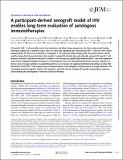A participant-derived xenograft model of HIV enables long-term evaluation of autologous immunotherapies
Author(s)
McCann, Chase D; van Dorp, Christiaan H; Danesh, Ali; Ward, Adam R; Dilling, Thomas R; Mota, Talia M; Zale, Elizabeth; Stevenson, Eva M; Patel, Shabnum; Brumme, Chanson J; Dong, Winnie; Jones, Douglas S; Andresen, Thomas L; Walker, Bruce D; Brumme, Zabrina L; Bollard, Catherine M; Perelson, Alan S; Irvine, Darrell J; Jones, R Brad; ... Show more Show less
DownloadPublished version (7.243Mb)
Publisher with Creative Commons License
Publisher with Creative Commons License
Creative Commons Attribution
Terms of use
Metadata
Show full item recordAbstract
<jats:p>HIV-specific CD8+ T cells partially control viral replication and delay disease progression, but they rarely provide lasting protection, largely due to immune escape. Here, we show that engrafting mice with memory CD4+ T cells from HIV+ donors uniquely allows for the in vivo evaluation of autologous T cell responses while avoiding graft-versus-host disease and the need for human fetal tissues that limit other models. Treating HIV-infected mice with clinically relevant HIV-specific T cell products resulted in substantial reductions in viremia. In vivo activity was significantly enhanced when T cells were engineered with surface-conjugated nanogels carrying an IL-15 superagonist, but it was ultimately limited by the pervasive selection of a diverse array of escape mutations, recapitulating patterns seen in humans. By applying mathematical modeling, we show that the kinetics of the CD8+ T cell response have a profound impact on the emergence and persistence of escape mutations. This “participant-derived xenograft” model of HIV provides a powerful tool for studying HIV-specific immunological responses and facilitating the development of effective cell-based therapies.</jats:p>
Date issued
2021Department
Ragon Institute of MGH, MIT and Harvard; Massachusetts Institute of Technology. Institute for Medical Engineering & Science; Massachusetts Institute of Technology. Department of Materials Science and Engineering; Koch Institute for Integrative Cancer Research at MIT; Massachusetts Institute of Technology. Department of Biological EngineeringJournal
The Journal of Experimental Medicine
Publisher
Rockefeller University Press
Citation
McCann, Chase D, van Dorp, Christiaan H, Danesh, Ali, Ward, Adam R, Dilling, Thomas R et al. 2021. "A participant-derived xenograft model of HIV enables long-term evaluation of autologous immunotherapies." The Journal of Experimental Medicine, 218 (7).
Version: Final published version